|
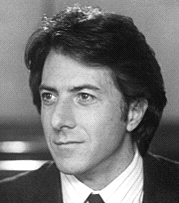
Dustin
Hoffman.
Actor. Born on Aug. 8, 1937, in Los
Angeles. Antiheroic, unlikely superstar of
Hollywood films of the late 60s and
forward. The son of a furniture designer,
he dropped out of Santa Monica City
College to attend the Pasadena Playhouse
and began acting at 19. He went to New
York, hoping for a career on the stage,
but for several years struggled along as a
janitor and attendant in a hospital mental
ward and in other menial jobs, such as
washing dishes, checking coats, waiting
tables, cleaning a dance studio, and selling
toys at Macy's. He once slept on fellow actor
Gene Hackman's floor while looking for work.
Eventually, he began getting occasional small
roles on TV and in summer stock, making his
stage debut in 1960 in "Yes Is for a Very
Young Man," but it wasn't until 1965 that he
was able to crash even off-Broadway. He
received his first big break the following
year when he won the Obie Award as best
off-Broadway actor of the year for his
performance in "The Journey of the Fifth
Horse." He received much critical praise
later in 1966 for his performance in the
British farce, "Eh?" Director Mike Nichols,
who saw the play, insisted that the
then-little-known Hoffman play the lead role
in his upcoming film The Graduate
(1967).
The great
commercial success of The
Graduate catapulted Hoffman into
instant stardom. It wasn't Hoffman's first
movie. Some months earlier he had appeared
in a low-budget Spanish-Italian
co-production, Madigan's
Millions, but that film wasn't
released in Europe or the US until after
The Graduate. He had also
played a minor role in the New York-made
The Tiger Makes Out. After
appearing on Broadway in "Jimmy Shine,"
Hoffman returned to the screen in John
Schlesinger's Midnight Cowboy
(1969), giving a memorable performance as
the pathetic Ratso Rizzo. He has since
demonstrated a remarkable range of screen
characterizations, drawing accolades for
his effective performances in widely
diverse roles. He played an Indian-adopted
white man who ages on screen from
adolescence to 121 in Little Big
Man (1970), portrayed a doomed ugly
little Frenchman on Devil's Island in
Papillon (1973), impersonated
tragic comedian Lenny Bruce in
Lenny (1974), and was
Washington Post reporter Carl
Bernstein in All the President's
Men (1976). He was an Academy Award
winner for his roles as a single dad in
Kramer Vs. Kramer (1979) and
for his portrayal of a naïve idiot
savant in Rain Man, (1989),
and was nominated for Academy Awards for
his performances in The Graduate,
Midnight Cowboy, and Lenny.
|
|
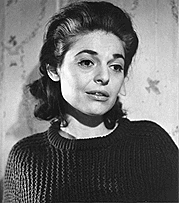
Anne
Bancroft.
Actress. Born Anna
Maria Louise Italiano, on Sept. 17, 1931,
in the Bronx, N.Y. Died of cancer on June
6, 2005, at Mount Sinai Hospital in New
York. ed. AADA; Actors Studio.
Actress and dancer, beginning at age four,
she started her professional career on TV
in 1950, using the name Anne Marno, and
made her motion picture debut in
Don't Bother to Knock (1952).
Hollywood kept her busy in a succession of
B films until she returned to New York and
appeared in "Two for the Seesaw" (1958)
opposite Henry Fonda, for which she
received a Tony. The following year, she
won the New York Drama Critics Award as
well as another Tony for her performance
in The Miracle Worker. She
repeated her Miracle Worker
performance with resounding success in the
film version, winning the 1962 Academy
Award for best actress. She played
memorable roles in the British film
The Pumpkin Eater (1964) and
also in The Graduate (1967)
and The Turning Point (1977).
Married to comedy director, writer, and
producer Mel Brooks for 41 years.
|
|
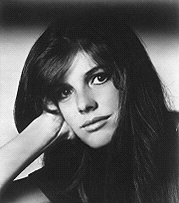
Katharine
Ross.
Actress. Born on Jan. 29, 1942, in Los
Angeles. ed. Santa Rosa College.
One of Hollywood's brightest new faces of
the 60s, she had gained acting experience
with the San Francisco Workshop and on
various television shows before making her
motion picture debut in 1965. She was
nominated for an Oscar for her performance
in The Graduate (1967). Her
career declined in the early 70s but
revived later in the decade.
|
|
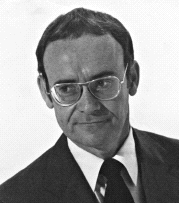
Buck
Henry.
Screenwriter, actor. Born Buck Henry
Zuckerman, in 1930, in New York City.
Died of a heart attack on January 8, 2020
at Cedars-Sinai Health Center in Los Angeles.
ed. Dartmouth. The son of former
Mack Sennett Bathing Beauty Ruth Taylor,
who starred in the silent 1928 version of
Gentlemen Prefer Blondes, and an
Air Force general later turned prominent
Wall Street stockbroker, he broke into
show business at 16 as a minor member of
the cast of the Broadway production "Life
with Father." He spent his military
service years during the Korean War
touring Germany with the Seventh Army
Repertory Company in a musical comedy that
he wrote, directed, and starred in. When
he returned to civilian life, he found
acting and writing jobs elusive but gained
some fame in the 50s as a hoaxer when,
with a friend, he formed SINA, the Society
for Indecency to Naked Animals, and
appeared on TV talk shows to promote with
a straight face his philosophical joke
about the link between the nudity of
animals and the moral decline of man. In
1960 he joined The Premise, the
off-Broadway improvisational theater
group, then moved to Hollywood, where he
began writing comedy material for the TV
shows of Steve Allen and Garry Moore and
for the weekly satirical show "That Was
the Week That Was." He hit the jackpot in
1964 as co-writer with Mel Brooks of the
pilot for the highly successful "Get
Smart" TV comedy series. That same year he
collaborated on the script of, and acted
in, the hilariously offbeat film The
Troublemaker and three years later
became one of Hollywood's most
sought-after comedy screenwriters after
collaborating on the script of the hit
film The Graduate. He also appears
in films as an actor, and in 1978 made his
directorial debut, collaborating with
Warren Beatty on Heaven Can Wait,
for which both were nominated for an
Oscar.
|
|
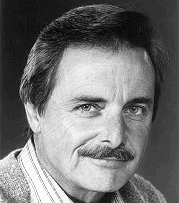
William
Daniels.
Actor. Born on Mar. 31, 1927, in Brooklyn,
N.Y. ed. Northwestern. Character
player of American stage, TV, and films.
Skilled at caricaturizing "types," from
henpecked husbands to phony politicians.
Played John Adams in 1776
(1972), repeating his lead role on
Broadway.
|
|
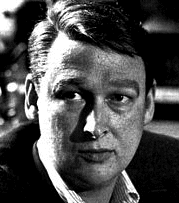
Mike
Nichols.
Director. Born Michael Igor Pechkowsky, on
Nov. 6, 1931, in Berlin. Died of died of a
heart attack on November 19, 2014, at his
apartment in Manhattan. He arrived in the
US with his family at age seven as an
emigré from Nazi Germany. When he
was 12 his doctor-father, a Russian-born
Jew, died, leaving the family financially
hard pressed. However, a bright student
and aggressive, Nichols was able to
continue his education thanks to a
succession of scholarships and a variety
of odd jobs. While at the University of
Chicago, he made his living as a night
janitor, post office clerk, hotel desk
clerk, and delivery truck driver, among
other things. It was at the university
that he first felt the urge to perform. He
went to New York and studied acting with
Lee Strasberg but was unable to land any
roles. Returning to Chicago, he joined
with Elaine May, Alan Arkin, Barbara
Harris, and Paul Sills to form an
improvisational group that performed at
the Compass, a restaurant-cabaret.
Nichols and May
then took to the road and by 1957 were
nationally acclaimed for the spontaneity
and wit of their improvised social satire.
They scored a tremendous success on
Broadway in 1960 with "An Evening With
Mike Nichols and Elaine May"; then broke
up, in 1961 after the show closed. The
following year Nichols played the lead in
a May play that closed after several
performances in Philadelphia. In 1963 he
made his debut as a Broadway director,
scoring a hit with "Barefoot in the Park."
He was since known as a man with the
Midas touch. Every play he subsequently
directed ("Luv," "The Odd Couple," etc.)
was a critical and popular smash.
Since the
mid-60s, Nichols directed films
with equal success, applying the same
formula that characterized his work on
stage -- crisp timing, an eye for detail,
and a special knack for working with
actors. He won the best director Academy
Award for The Graduate. But despite
four successive early hits he still seemed
like a director in search of a personal
style and a clear approach. Nichols died on
Nov. 19, 2014, at the age of 83.
- Ephraim Katz,
The Film Encyclopedia, Perigee,
1979.
|
|
|
The Graduate fun
fact #1:
Doris Day, the wholesome
actress whose movie career was on a down slide by
the late Sixties, was approached to play the role
of Mrs. Robinson. She turned the part down because
she thought that, according to one close associate,
the movie was "trashy."
The Graduate fun
fact #2:
The stocking-clad legs you
see in the foreground on the movie poster for The
Graduate don't belong to Anne Bancroft. They're
actually those of a 26-year-old Linda Gray, who a
decade later portrayed Sue Ellen Ewing in the popular
TV series Dallas. The famous composition was
created by storyboard artist Harold Michelson, who with
his wife Lillian created iconic images not only for
The Graduate but other films including The
Ten Commandments, West Side Story, Fiddler on the Roof,
The Birds, Spartacus, Bonnie and Clyde and Easy
Rider.
The Graduate fun
fact #3:
The Graduate's producers
originally offered Dustin Hoffman the leading male
role in the picture only if he would sign a major
contract for a six-picture deal with them. He refused
to make such a commitment, but they wanted him so
badly they eventually offered him the role anyway.
He was paid $20,000 for his work in the film and was
in New York City drawing unemployment as the movie
became a huge hit and made him one of the hottest
actors of the late Sixties.
The Graduate fun
fact #4:
When taking the screen
test for The Graduate, Dustin Hoffman said,
"I don't think I'm right for the role. He's a kind
of Anglo-Saxon, tall, slender, good-looking chap.
I'm short and Jewish." During the screen test he
forgot his lines and was nervous and
clumsy.
The Graduate fun
fact #5:
The Graduate was
made by Joseph E. Levine's upstart studio Embassy
Pictures, outside the realm of the largest movie
studios. With a box-office gross of $104,397,102,
The Graduate was ranked as the fifth most
popular independent film of all-time by
People magazine in 1996.
The Graduate fun
fact #6:
Although The Graduate
is considered Dustin Hoffman's signature role, he won
Oscars for Best Actor for his roles in Kramer Vs.
Kramer in 1979 and Rain Man in 1989. He also
won an Emmy in 1986 for Best Actor in a Made-For-TV-Movie
for Death of a Salesman. But Hoffman almost didn't
get his career-making role in The Graduate.
Director Mel Brooks had signed him for a role in his
comedy Springtime for Hitler, and Hoffman had to
ask Brooks for permission to audition for Mike Nichols'
new movie. Brooks gave him permission to try out for the
role, partly because his wife Anne Bancroft (who had
already signed on to be Mrs. Robinson) encouraged him to,
and partly because he thought Hoffman "wasn't good looking
enough for the role" and wouldn't get it anyway.
The Graduate fun
fact #7:
According to Variety,
The Graduate was the second biggest box-office
draw of 1967, raking in some $44,090,729 that year
in rentals by theaters from its studio, American
General Cinema. As of July 1995, The
Graduate was the fifteenth top-grossing movie
of all time, with an adjusted gross of $356,832,711
at the box office.
The Graduate fun
fact #8:
Although The
Graduate lost out to In the Heat of the
Night for Best Picture at the 1967 Academy
Awards, Mike Nichols won the Oscar for Best
Director that year for his breakthrough work on
The Graduate. He also won the Director's
Guild Award the same year. Also nominated for
Oscars that year for their work in picture were
Dustin Hoffman (Best Actor), Anne Bancroft (Best
Actress), Katharine Ross (Best Supporting Actress),
Calder Willingham and Buck Henry (Writing), and
Robert Surtees (Cinematography).
The Graduate fun
fact #9:
As of 1995, The
Graduate male lead Dustin Hoffman is 27th
most popular actor of all-time, based on a
People magazine analysis of Quigley
Publishing's Top Ten star list, which was began in
1933. He was chosen as the 9th Best Actor/Modern in
in an online poll conducted by Entertainment
Weekly magazine in 1999.
The Graduate fun
fact #10:
A hit London stage
production based on The Graduate began its
run in April 2000. Actresses taking on the part of a
nude Mrs. Robinson have included Kathleen Turner,
Mick Jagger's ex-wife Jerry Hall, Amanda Donohoe,
Anne Archer and Linda Gray.
The Graduate fun
fact #11:
In Feb. 2004, Dustin Hoffman
reprised Benjamin's famous dash to church to stop
Elaine's wedding for a car commercial that aired in
Europe only. The ad, filmed in La Verne, Calif., and
directed by Michael Bay, was only the second commercial
Hoffman had appeared in (his first was a VW Beetle ad
in the 1960s before becoming famous). In the commercial,
Hoffman again rescues the bride, but this time returns
to a 2005 Audi.
|